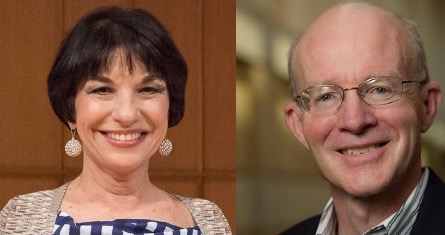
About this Episode:
Interviewed by Kellogg Institute PhD Fellow Benjamín García Holgado, faculty fellows Scott Mainwaring (former director of the Kellogg Institute) and Maria Rosa Olivera Williams (professor of Latin American literature) discuss their long relationship with the Kellogg Institute, what they remember of Kellogg when they joined in the 1980s, the impact that Kellogg has had on their scholarship, what distinguishes the Institute from other university institutes, and how they envision Kellogg moving forward.
Show Notes:
Welcome to Global Stage, a podcast highlighting academic and policy-oriented international research on democracy and human development! Global Stage is brought to you by the Kellogg Institute for International Studies, part of the Keough School of Global Affairs at the University of Notre Dame. Your host today is Benjamín García, a Kellogg PhD fellow and doctoral candidate in political science.
In today’s episode, Benjamín is joined by two special guests – Faculty Fellows Scott Mainwaring and Maria Rosa Olivera-Williams – to celebrate Kellogg’s 40-year anniversary. Scott is a professor of political science and former Director of the institute, and Maria Rosa is a professor of Latin American literature.
To begin, Scott shares that the Kellogg Institute was a very small group of people when he first joined in 1983. He initially came as a visiting fellow and became the fifth person to join the faculty. The faculty focused on Latin America and social science, looking at questions of moving away from dictatorship and building solid democracies in the region. Maria joined the Kellogg Institute five years after Scott, a small but brilliant group of people. She was delighted to listen to the conversations around her. Since then, she shares, Kellogg has grown dramatically and seen a number of different directors and faculty. Eventually, they began to incorporate other countries and continents of study and research. Scott adds that thinking about democratization and more equitable forms of development to support democracy were among the themes Kellogg began to take on in the late 1980s. By the 2000s, they felt a push to become stronger in human development.
From the very beginning of the Kellogg Institute, Scott shares, there was an exceptional collegial experience and scholarly community. A trademark of Kellogg related scholarship is the study of issues which are very important in the world. Kellogg was initially conceived of and practiced as an academic community which deeply integrated Latin Americans. Maria shares how literature plays a role in politics and has a huge overlap with international study. Before wrapping up, our guests identify Kellogg’s signature differentiating marks. First, much of the faculty continues to focus heavily on Latin America and have established networks there. Additionally, they boast a very positive scholarly environment not commonly found in other research departments. Finally, Scott and Maria envision Kellogg’s excellence and leadership moving forward.
Links:
Learn more about Scott Mainwaring
Learn more about Maria Rosa Olivera Williams
Learn more about Kellogg's 40th Anniversary Celebration
Listen:
Listen below, ask your smart device to “play Global Stage Podcast,” or find us on:
Apple | Spotify | Google Podcasts | Stitcher | iHeartRadio | TuneIn





